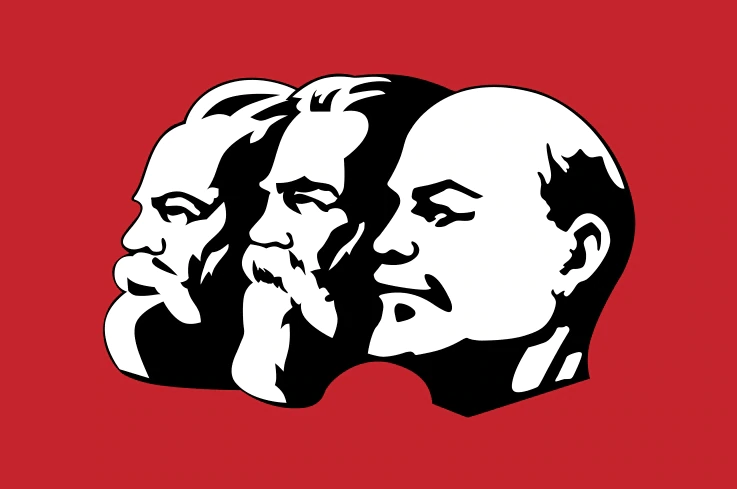More languages
More actions
Jucheguevara (talk | contribs) m (Reverted edits by Jucheguevara (talk) to last revision by FelipeForte) Tag: Rollback |
Jucheguevara (talk | contribs) (added some paragraphs to the beginning) Tag: Visual edit |
||
| Line 1: | Line 1: | ||
[[File:Marxism-leninism symbol.png|thumb]] | [[File:Marxism-leninism symbol.png|thumb]] | ||
'''Marxism-Leninism''' is the | '''Marxism-Leninism''' is a [[Communism|communist]] ideology and was main communist movement throughout the 20th century. Marxism–Leninism was the formal name of the official state ideology adopted by the [[Soviet Union]], the [[Eastern Bloc]] and various self-declared ''[[Scientific socialism|scientific socialist]]'' governments in the [[Non-Aligned Movement]] and [[Third World]] during the [[Cold War]] as well as the [[Communist International]] after [[Bolshevisation]]. | ||
Today, Marxism–Leninism is the ideology of several [[communist parties]] and remains the official ideology of the ruling parties of [[Communist Party of China|China]], [[Communist Party of Cuba|Cuba]], [[Lao People's Revolutionary Party|Laos]] and [[Communist Party of Vietnam|Vietnam]] as unitary [[one-party]] [[Socialist republic|socialist republics]] and of [[Nepal Communist Party|Nepal]] in a [[People's Multiparty Democracy|people's multiparty democracy]]. | |||
The ideology was formally synthesized by [[Joseph Stalin|Stalin]], derived from theory and practice developed mainly by [[Marx]], [[Engels]] and [[Lenin]]. Based on the [[Marxism|marxist]] [[Historical materialism|conception of history]] and critique of political economy, Marxism-Leninism made significant contributions to the critique of the [[Imperialism|imperialist]] development of capitalism and developed its own theoretical categories related to the revolutionary praxis and political party organization, such as ''[[vanguard party]]'' and ''[[democratic centralism]].'' | |||
After the success of the [[Russian revolution]] in 1917 and the establishment of the [[Soviet Union]], many communist parties around the world adopted Marxism-Leninism as their political line, and was the guiding theoretical framework behind the [[Korean revolution|Korean]], [[Vietnamese revolution|Vietnamese]], and the [[Chinese revolution|Chinese]] revolutions. | After the success of the [[Russian revolution]] in 1917 and the establishment of the [[Soviet Union]], many communist parties around the world adopted Marxism-Leninism as their political line, and was the guiding theoretical framework behind the [[Korean revolution|Korean]], [[Vietnamese revolution|Vietnamese]], and the [[Chinese revolution|Chinese]] revolutions. | ||
Revision as of 18:10, 24 February 2021

Marxism-Leninism is a communist ideology and was main communist movement throughout the 20th century. Marxism–Leninism was the formal name of the official state ideology adopted by the Soviet Union, the Eastern Bloc and various self-declared scientific socialist governments in the Non-Aligned Movement and Third World during the Cold War as well as the Communist International after Bolshevisation.
Today, Marxism–Leninism is the ideology of several communist parties and remains the official ideology of the ruling parties of China, Cuba, Laos and Vietnam as unitary one-party socialist republics and of Nepal in a people's multiparty democracy.
The ideology was formally synthesized by Stalin, derived from theory and practice developed mainly by Marx, Engels and Lenin. Based on the marxist conception of history and critique of political economy, Marxism-Leninism made significant contributions to the critique of the imperialist development of capitalism and developed its own theoretical categories related to the revolutionary praxis and political party organization, such as vanguard party and democratic centralism.
After the success of the Russian revolution in 1917 and the establishment of the Soviet Union, many communist parties around the world adopted Marxism-Leninism as their political line, and was the guiding theoretical framework behind the Korean, Vietnamese, and the Chinese revolutions.
Origin of the term
Lenin never used the term leninism, nor did he include his ideas in the term "Marxism-Leninism". However, his ideas developed out of classical marxist thought, which was seen by the Bolsheviks as Lenin's advancement of marxism, and by others as the opposite. After Lenin's death in 1924, his ideas and contributions to marxism were codified as "Marxism-Leninism" by Stalin and the term soon became the name given to this theoretical framework by communist parties around the world.
